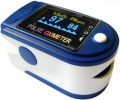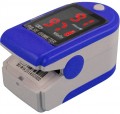The type of display provided in the design of the device.
— Monochrome. Monochrome displays in pedometers and heart rate monitors typically show one primary color, commonly classic black and white like electronic watches. Some variations use different main colors, such as blue or green, on dark or light backgrounds. While monochrome displays may not offer the richness and variety of information that color displays do, they are more cost-effective and widely prevalent across all price ranges, from budget to high-end devices.
— Coloured. Colour displays in
heart rate monitors and pedometers can work with various primary colours, offering different functionalities and a range of displayed colors. However, these screens are generally simpler compared to other portable electronics like media players or smartwatches. While color screens provide more information and a visually appealing look, they come at a higher cost. The aesthetic value of color is often prioritized, even though there is rarely a practical need for a coloured display. As a result, this option is less common in heart rate monitors and pedometers.
— Is absent. The complete absence of a display indicates that the device is designed to be connected to an external device with a screen (smartphone, exercise machine, etc.). All heart sensors have this design, however, it is also found among other types of devices (see "Type") — for example, among pedo
...meters mounted on shoes or on the shoulder (see "Purpose"), where it would be simply inconvenient to look at the built-in display.
